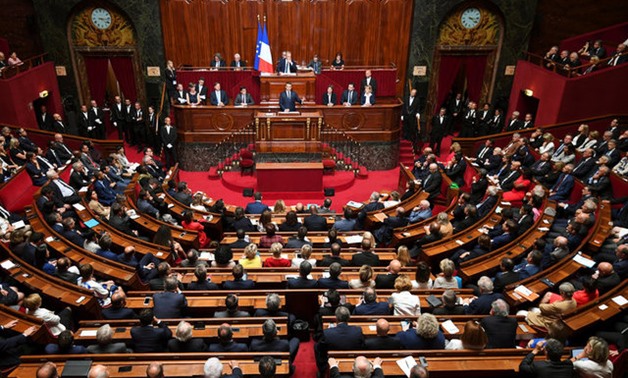
French President Emmanuel Macron delivers a speech during a special congress gathering both houses of parliament at the Versailles Palace
VERSAILLES/PARIS, France, July 3 (Reuters) - France's new president, Emmanuel Macron, told parliament in a ceremonial address on Monday that he would seek direct approval from voters in a referendum if parliament failed to sign off his intended institutional reforms quickly enough.
Elected only two months ago by a hefty majority, Macron told the lawmakers of both houses, summoned especially to the Palace of Versailles, that he wanted to cut the number of lawmakers by a third, curb the executive's role in naming magistrates, and introduce a "dose" of proportional representation.
Macron's upstart Republic on the Move (LREM) party has secured a comfortable majority in the National Assembly - but France's youngest leader since Napoleon made clear his impatience to complete the reshaping of the political landscape that he has begun.
"The French people are not driven by patient curiosity, but by an uncompromising demand. It is a profound transformation that they expect," Macron told the specially convened joint session of parliament.
"I want all these deep reforms that our institutions seriously need to be done within a year. These reforms will go to parliament but, if necessary, I will put them to voters in a referendum."
Macron also pressed his case for reform of Europe.
An ardent advocate of deeper European Union integration who put reviving Europe's Franco-German axis and treaty reform at the centre of his presidential campaign, Macron said excessive bureaucracy had fueled euroscepticism among the public.
"The last 10 years have been cruel for Europe. We have managed crises but we have lost our way," Macron said.
"I firmly believe in Europe, but I don't find this scepticism unjustified."
Macron, whose centrist platform has routed both the traditional rightist and leftist parties of government, is not the first French leader to convene a so-called Congress of both houses, though past presidents have tended to use it in times of crisis or for constitutional reforms.
Macron's aides had said that, by bringing parliament's 925 lawmakers to the 17th century palace built outside Paris by Louis XIV - the 'Sun King' - the president was seeking to restore old-fashioned grandeur to the role.
"JUPITERIAN" PRESIDENT
Macron himself has said he plans a "Jupiterian" presidency - as a remote, dignified figure, like the Roman god of gods, who weighs his rare pronouncements carefully. It would be a marked break from his unpopular and often-mocked predecessor Francois Hollande's man-of-the-people style.
While many in France still hold dear the trappings of presidential power, Macron's style has grated with others who lament the strong powers that the constitution drawn up by the war hero Charles de Gaulle bestows on the presidency.
A commanding parliament majority, including dozens of legislators who are new to politics, has tightened Macron's grip further still.
Nonetheless, his opponents said his address was light on details.
"We're none the wiser coming out than we were going in," said far-right leader Marine Le Pen, who Macron defeated in the presidential run-off vote. "He speaks of a dose of proportional representation, but we don't know if he's talking about a small dose or a big dose."
Le Pen blames France's electoral system for her National Front party's poor representation in parliament.
Beyond the plans for institutional reform, which had been outlined in his campaign manifesto, there were few concrete announcements and no specifics on the far more controversial measures that he plans, most notably in liberalising a highly regulated labour market.
Many of those were likely to be sketched out by Macron's prime minister, Edouard Philippe, when he addresses parliament on Tuesday.
Opposition lawmakers from three parties including the far-left France Unbowed boycotted Macron's address, and about 100 Communists wearing the red caps of the French revolutionaries of 1789 demonstrated in front of Versailles' town hall.
"Mr Macron is a challenge to democracy," said Nicole Coulbaut, a 65-year old retired teacher and Communist activist. "For him, it's not parliament or the people who govern, but himself, Jupiter." (Editing by Kevin Liffey and Toby Chopra)


Comments
Leave a Comment